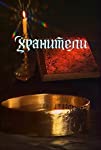Eye For Film >> Movies >> Keepers (1991) Film Review
Keepers
Reviewed by: Jennie Kermode

In the 1920s and 1930s, Soviet Russia produced some of the greatest cinema in the world. By 1991, its empire crumbling, things were a little different. This adaptation of JRR Tolkien's The Fellowship Of The Ring - the first part of the Lord Of The Rings trilogy - is a long way from Eisenstein. It will have inevitable appeal to curious Tolkien fans, however, and from a cultural or historical perspective there's a good deal that's intriguing about it. It also features music by Akvarium, which, to put it in perspective for Western viewers, is a bit like an Asylum film having an original soundtrack by the Pogues.
One of the things that Akvarium are known for is their use of traditional folk themes, and this suits the film perfectly. The fantasy world that Tolkien created blends with distinctive Russian elements to create something unique. It would make a fine subject for a literature class exploring the way that different cultural perspectives inform our understanding of the same material. In many places, however, the scriptwriter's intentions are obscured by the evident difficulty that the director has had with working on a very small budget. There's a can-do attitude about the production which is very endearing but doesn't always succeed in producing something watchable. This is filmmaking as the Blue Peter team might have done it. Everything looks home made or second hand, some of the costumes are evidently just blankets pinned in place, and most scenes have been shot on the same small set with different lighting filters or badly green-screened backgrounds to try and make it look more exciting.
Despite its difficulties, the film largely manages to stay true to the book, and includes the much-loved Tom Bombadil sequence which Peter Jackson left out. Its effort to adhere to the source material is one of its problems, however, as large chunks of dialogue are lifted from the book and translated but not altered with a view to the dramatic context, so there's a great weight of exposition. The first quarter of the film consists almost entirely of Gandalf and Bilbo talking like this, and viewers are likely to get impatient with this. it's a problem which is, to an extent, mirrored in the original text, which is also weighed down by the persistent singing of the elves (a nod to Skaldic tradition, but even if one knows this, it drags a bit). Here the elves do not sing but there is a prolonged sequence of them doing nothing but dance about. The effect of all this is to sap the tension in a story which is, ultimately, about one long pursuit.
What Russia does have plenty of is trees and snow so, though they don't quite rival Aotearoa/New Zealand, the outdoor sequences have potential. This is let down somewhat by the square format (most Russian genre work, historically, was made with television in mind) and by some curious directorial choices which randomly cut characters' heads out of shot. For all the roughness of the costumes one feels, at times, as though one is watching reality TV, as so much of the film seems unplanned. The very ordinary appearance of the actors adds to this. The only ones to get a touch of glamour are Goldberry and Galadriel, and this translates as big hair and glitter.
Cursory attempts are made at making the hobbits look smaller than other characters, but as this appears to have been dropped when the budgets ran out, the result is that they change size from scene to scene. Gimli looks much like any other man (but then, perhaps, he should, for the literature in which Tolkien based his books never actually asserted that dwarfs are small). Legolas gets floppy hair and a silk shirt which looks like the most expensive item in the film. The female characters look plump and healthy, in keeping with Russian tradition and in stark contrast to Hollywood's ideas of beauty.
Although Valery Diachenko, playing Frodo, lacks much-needed charisma, most of the performances are not too bad, and there are plainly some experienced theatre actors slumming it here. Everyone approaches the work with commendable sincerity. The presence of magic is conveyed through the use of disco lights and the presence of evil through techniques that, even as they make you laugh, may well give you a creepy feeling. There's something to all this, and one can imagine children taking it very seriously indeed.
On the surface, this is a terrible film. Given the clearly desperate circumstances under which it was cobbled together, however, one might well consider it a triumph.
Reviewed on: 07 Apr 2021
















